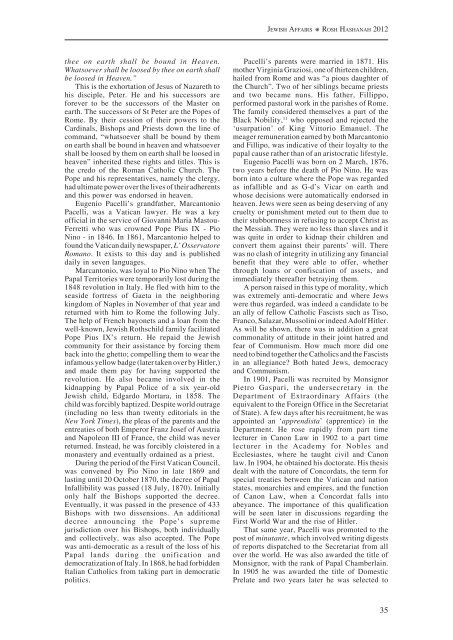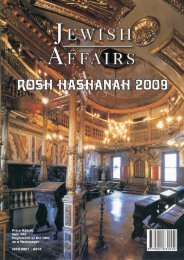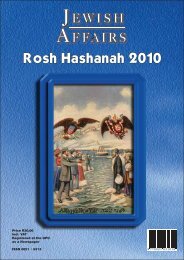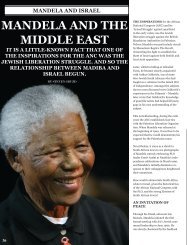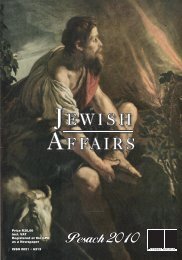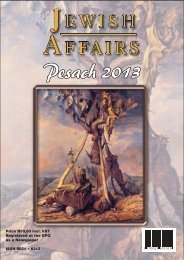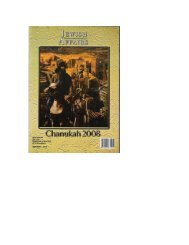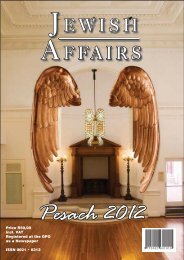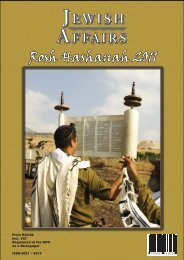Jewish Affairs - South African Jewish Board of Deputies
Jewish Affairs - South African Jewish Board of Deputies
Jewish Affairs - South African Jewish Board of Deputies
- No tags were found...
You also want an ePaper? Increase the reach of your titles
YUMPU automatically turns print PDFs into web optimized ePapers that Google loves.
JEWISH AFFAIRS ROSH HASHANAH 2012thee on earth shall be bound in Heaven.Whatsoever shall be loosed by thee on earth shallbe loosed in Heaven.”This is the exhortation <strong>of</strong> Jesus <strong>of</strong> Nazareth tohis disciple, Peter. He and his successors areforever to be the successors <strong>of</strong> the Master onearth. The successors <strong>of</strong> St Peter are the Popes <strong>of</strong>Rome. By their cession <strong>of</strong> their powers to theCardinals, Bishops and Priests down the line <strong>of</strong>command, “whatsoever shall be bound by themon earth shall be bound in heaven and whatsoevershall be loosed by them on earth shall be loosed inheaven” inherited these rights and titles. This isthe credo <strong>of</strong> the Roman Catholic Church. ThePope and his representatives, namely the clergy,had ultimate power over the lives <strong>of</strong> their adherentsand this power was endorsed in heaven.Eugenio Pacelli’s grandfather, MarcantonioPacelli, was a Vatican lawyer. He was a key<strong>of</strong>ficial in the service <strong>of</strong> Giovanni Maria Mastou-Ferretti who was crowned Pope Pius IX - PioNino - in 1846. In 1861, Marcantonio helped t<strong>of</strong>ound the Vatican daily newspaper, L’ OsservatoreRomano. It exists to this day and is publisheddaily in seven languages.Marcantonio, was loyal to Pio Nino when ThePapal Territories were temporarily lost during the1848 revolution in Italy. He fled with him to theseaside fortress <strong>of</strong> Gaeta in the neighboringkingdom <strong>of</strong> Naples in November <strong>of</strong> that year andreturned with him to Rome the following July.The help <strong>of</strong> French bayonets and a loan from thewell-known, <strong>Jewish</strong> Rothschild family facilitatedPope Pius IX’s return. He repaid the <strong>Jewish</strong>community for their assistance by forcing themback into the ghetto; compelling them to wear theinfamous yellow badge (later taken over by Hitler,)and made them pay for having supported therevolution. He also became involved in thekidnapping by Papal Police <strong>of</strong> a six year-old<strong>Jewish</strong> child, Edgardo Mortara, in 1858. Thechild was forcibly baptized. Despite world outrage(including no less than twenty editorials in theNew York Times), the pleas <strong>of</strong> the parents and theentreaties <strong>of</strong> both Emperor Franz Josef <strong>of</strong> Austriaand Napoleon III <strong>of</strong> France, the child was neverreturned. Instead, he was forcibly cloistered in amonastery and eventually ordained as a priest.During the period <strong>of</strong> the First Vatican Council,was convened by Pio Nino in late 1869 andlasting until 20 October 1870, the decree <strong>of</strong> PapalInfallibility was passed (18 July, 1870). Initiallyonly half the Bishops supported the decree.Eventually, it was passed in the presence <strong>of</strong> 433Bishops with two dissensions. An additionaldecree announcing the Pope’s supremejurisdiction over his Bishops, both individuallyand collectively, was also accepted. The Popewas anti-democratic as a result <strong>of</strong> the loss <strong>of</strong> hisPapal lands during the unification anddemocratization <strong>of</strong> Italy. In 1868, he had forbiddenItalian Catholics from taking part in democraticpolitics.Pacelli’s parents were married in 1871. Hismother Virginia Graziosi, one <strong>of</strong> thirteen children,hailed from Rome and was “a pious daughter <strong>of</strong>the Church”. Two <strong>of</strong> her siblings became priestsand two became nuns. His father, Fillippo,performed pastoral work in the parishes <strong>of</strong> Rome.The family considered themselves a part <strong>of</strong> theBlack Nobility, 11 who opposed and rejected the‘usurpation’ <strong>of</strong> King Vittorio Emanuel. Themeager remuneration earned by both Marcantonioand Fillipo, was indicative <strong>of</strong> their loyalty to thepapal cause rather than <strong>of</strong> an aristocratic lifestyle.Eugenio Pacelli was born on 2 March, 1876,two years before the death <strong>of</strong> Pio Nino. He wasborn into a culture where the Pope was regardedas infallible and as G-d’s Vicar on earth andwhose decisions were automatically endorsed inheaven. Jews were seen as being deserving <strong>of</strong> anycruelty or punishment meted out to them due totheir stubbornness in refusing to accept Christ asthe Messiah. They were no less than slaves and itwas quite in order to kidnap their children andconvert them against their parents’ will. Therewas no clash <strong>of</strong> integrity in utilizing any financialbenefit that they were able to <strong>of</strong>fer, whetherthrough loans or confiscation <strong>of</strong> assets, andimmediately thereafter betraying them.A person raised in this type <strong>of</strong> morality, whichwas extremely anti-democratic and where Jewswere thus regarded, was indeed a candidate to bean ally <strong>of</strong> fellow Catholic Fascists such as Tiso,Franco, Salazar, Mussolini or indeed Adolf Hitler.As will be shown, there was in addition a greatcommonality <strong>of</strong> attitude in their joint hatred andfear <strong>of</strong> Communism. How much more did oneneed to bind together the Catholics and the Fascistsin an allegiance? Both hated Jews, democracyand Communism.In 1901, Pacelli was recruited by MonsignorPietro Gaspari, the undersecretary in theDepartment <strong>of</strong> Extraordinary <strong>Affairs</strong> (theequivalent to the Foreign Office in the Secretariat<strong>of</strong> State). A few days after his recruitment, he wasappointed an ‘apprendista’ (apprentice) in theDepartment. He rose rapidly from part timelecturer in Canon Law in 1902 to a part timelecturer in the Academy for Nobles andEcclesiastes, where he taught civil and Canonlaw. In 1904, he obtained his doctorate. His thesisdealt with the nature <strong>of</strong> Concordats, the term forspecial treaties between the Vatican and nationstates, monarchies and empires, and the function<strong>of</strong> Canon Law, when a Concordat falls intoabeyance. The importance <strong>of</strong> this qualificationwill be seen later in discussions regarding theFirst World War and the rise <strong>of</strong> Hitler.That same year, Pacelli was promoted to thepost <strong>of</strong> minutante, which involved writing digests<strong>of</strong> reports dispatched to the Secretariat from allover the world. He was also awarded the title <strong>of</strong>Monsignor, with the rank <strong>of</strong> Papal Chamberlain.In 1905 he was awarded the title <strong>of</strong> DomesticPrelate and two years later he was selected to35


